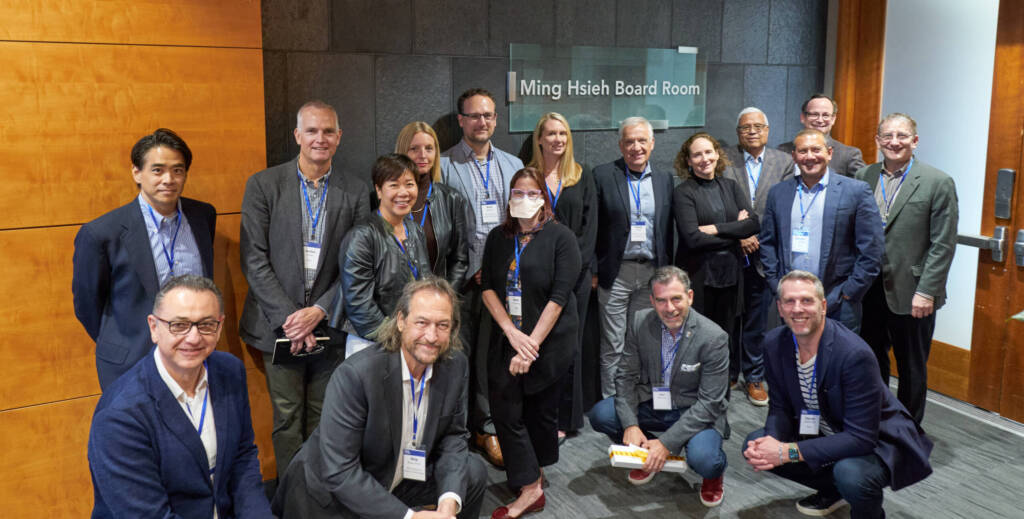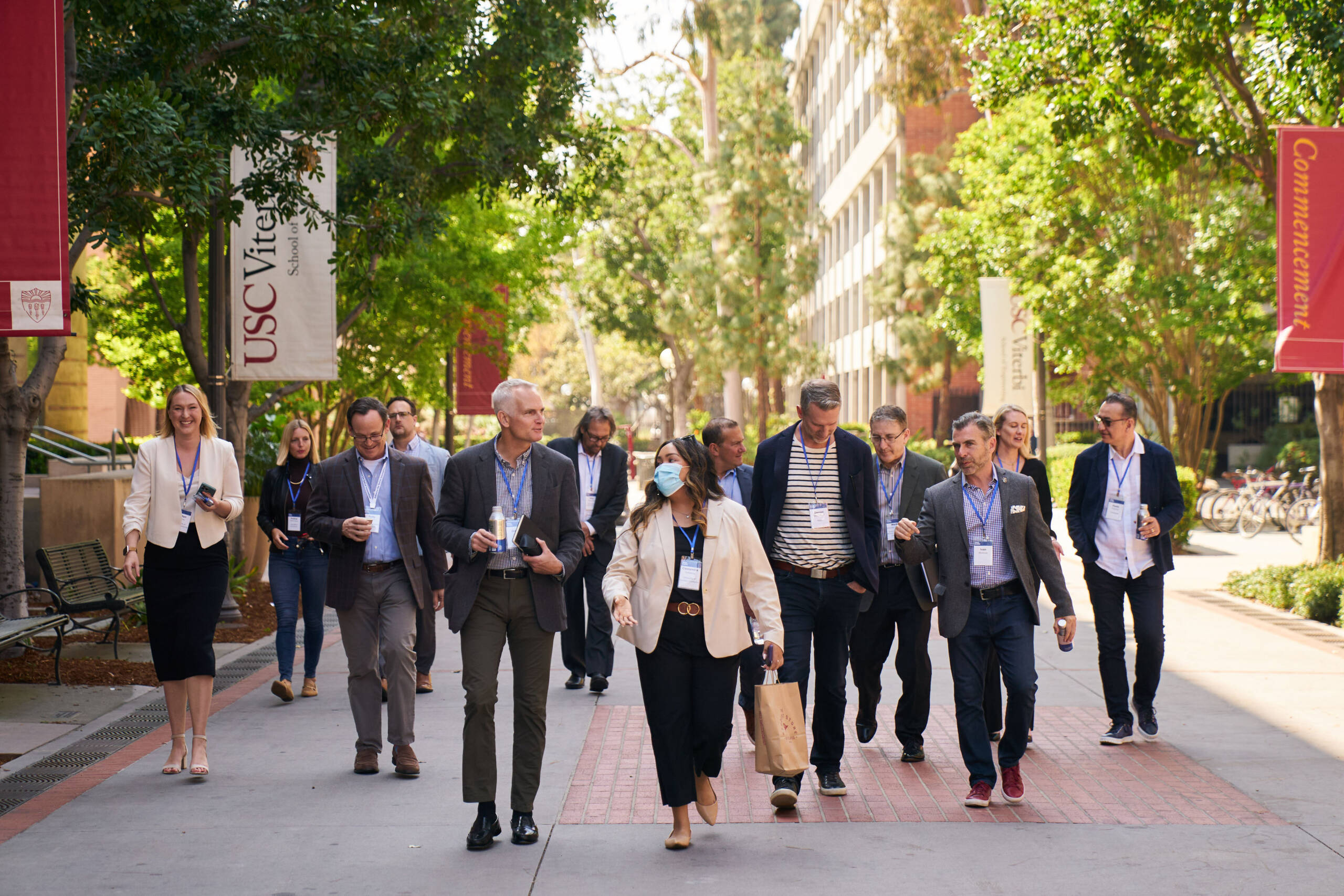Digital transformation is rethinking how an organization uses technology, people, and processes that create faster and better business models through instantly accessible data. Digital transformation is an in-depth analysis of organizations looking to accelerate, scale operations, and create new revenue streams while changing customer expectations around products and services. Investment in research, innovation, and technology plays critical roles in this digital era, so USC’s commitment to these areas will create possibilities at the edge of every frontier.
In May, the USC Office of Research and Innovation and the USC Stevens Center for Innovation hosted an “Innovation in Higher Education and Industry” roundtable with digital transformation leaders across many sectors. Techstars and the Alliance for SoCal Innovation led the first-of-its-kind USC event at the Viterbi School of Engineering which was initiated by Morgan Berman, Vice President of Partnership at Techstars and Dr. Steven Moldin, Associate Vice President, Research Strategy and Innovation at USC. This roundtable discussion served as a super-connector opportunity to share innovative technologies and discuss Southern California’s vibrant entrepreneurial ecosystem and the social impact of artificial intelligence which was debated on Capitol Hill that week.
Prior to the meeting in the Ming Hsieh Board Room, attendees were given an interactive tour of USC’s Baum Family Maker Space, a design and fabrication center used by undergraduate students from the Viterbi School. Professor Allan Weber gave an interactive tour that showcased several innovative student-run projects. Viterbi School Dean Yannis C. Yortsos shared that most student projects stem from their curiosity and passion for being a part of competition teams.
After the tour, Senior Vice President of Research and Innovation, Dr. Ishwar K. Puri, welcomed participants to USC and highlighted the university’s mission to invest in rigorous research, equating to almost $1 billion and will grow to $1.5 billion this decade. From unicorns like Relativity Space to the school’s newest initiative, Frontiers of Computing, USC has attracted faculty and students to be the next generation of innovators, researchers, and thought leaders, creating a world where technology advances and serves humanity.
“Frontiers of Computing is a very exciting initiative, and Dean Yortsos is leading a major part of it. It’s a billion-dollar initiative,” said Dr. Puri. “One portion of the initiative is to establish a campus called Silicon Beach. USC has presence in Marina del Rey and Playa Vista and we want to expand innovation, amplify the work at the Alfred E. Mann Institute (AMI), and have our researchers commercialize their inventions through the Stevens Center, our tech transfer office, or the Silicon Beach campus,” he said.
Dean Yortsos provided additional excitement about USC’s prominent role in higher education and advanced computing from a R & D perspective.
“The School of Engineering has about $200 million a year of research expenditures. There’s a lot of computer science work here, and the Frontiers of Computing initiative is within the engineering discipline because we can branch out across the entire university,” he said.
Dean Yortsos added, “We are well suited for advancing digital initiatives and enabling discovery and innovation in all fields,” he said.
Andy Wilson, Executive Director for the Alliance for SoCal Innovation, set the stage for an insightful discussion about the growing need for ethical and responsible leaders in the age of powerful technologies and introduced Iván Markman, the moderator, and three panelists:
- Darren MacDonald, Chief Customer Officer of Petco, discussed the evolution of retail, including Petco’s integrated business model and targeted personalization.
- Paolo Pirjanian, Founder and CEO of Embodied, provided his vision for Moxie, a social robot designed with technology that allows it to engage with children in a revolutionary way.
- Dr. Skip Rizzo, Director for Medical Virtual Reality at the USC Institute for Creative Technologies (ICT), showcased his creative use of VR in helping address mental health challenges, and shared his research and vision.
Important points from panelists’ presentations:
- Mr. Pirjanian stressed that emotional intelligence in AI is essential. As we are experiencing an explosive growth of AI systems, ensuring that these systems are emotionally intelligent in serving humanity is of utmost importance. He introduces an AI social robot called Moxie that makes eye contact, reads facial expressions, and converses with children. In a study conducted by Embodied, their researchers found Moxie improved eye contact, self-esteem and emotional regulations for school-aged children with autism after regularly interacting with the robot. Mr. Pirjanian eventually hopes to develop these robots for older adults in isolation or those with Alzheimer’s or dementia. However, he acknowledged that companies and their consumers need to handle AI responsibly and use it as a tool, not as a replacement for human interaction.
- Dr. Rizzo presented his Battle Buddy and Virtual Ukraine VR applications from USC’s ICT to treat mental health, PTSD, and suicide prevention. Mental health is one of the best areas for clinical use of virtual reality, and the tool is a way to draw in people who wouldn’t pursue therapy in the traditional sense. People will disclose more to a virtual human than a traditional clinician. His team is working on virtual humans for health and wellness support for veterans and professionals dealing with burnout. Dr. Rizzo predicts that most people will interact daily with a virtual human within five years.
- Mr. MacDonald shared that when it comes to retail, people want convenient and personalized things. Petco wants to craft retail experiences that feel unique to the purchaser. Generative AI can be used to develop marketing tactics and show shoppers the right thing at the right time, which opens opportunities to sell at the right moment.
Focusing on higher education and industry, Mr. Markman asked roundtable participants stimulating questions about partnerships between USC and businesses. He said, “What is the role of an institution like USC in your business? What is the role of public-private partnerships? What are the areas we should focus on related to privacy?”
More takeaways from the thought-provoking discussion which included Dean Amber D. Miller of USC Dornsife College of Letters, Arts, and Sciences, and experts across many industries:
- Digital transformation has benefited from public and private benefits; they’ve donated money; they work with private foundations; partnerships are important to commercialize this work.
- Companies hire from Southern California institutions, mostly in data science, and some tech transfers to advance and commercialize researchers’ inventions.
- Invest in companies coming out of SoCal that are advancing therapeutics for animals using things like AI. Talent and ideas continue to come from universities.
- How much privacy will people be willing to give up, and what are the corresponding benefits of giving this up? We need to do a better job notifying people when they are being tracked online, especially for vulnerable populations who may not realize where their data is going. Help people make informed decisions and help them learn how to do their cost-benefit analysis, especially for vulnerable people.
- AI is moving very quickly, and many issues will arise way quicker than we anticipated.
- We must develop better humans who are more socially responsible.
- The future is in academia. We have a better connection when you have a good idea and evolve it. You do the science, have a place for it to go, and kick it out of the lab, but keep a little bit because you want to keep all your ideas from getting licensed. You still want to work with them and grow it.
- Generative AI is a game changer; we’re just beginning to see what’s happening. We are going to see things grow at an exponential rate. We can now do things in a week that would have taken decades.
- People can abuse powerful technologies to do a lot of damage, or people can use powerful technologies to change the world for the better.
- We need to balance the need for real human interaction with the boundaries of what technology can do because it has gotten so good that it can do all sorts of things.
- We have ethical and social responsibilities to ensure that products don’t become addictive, replace humans, or create an isolated world for children and adults.
- There’s a reemergence of liberal arts education for building better humans and better societies. Critical thinkers can be responsible stewards of technologies that are constantly evolving.
To continue the engaging discussion, USC hosted a rooftop sunset dinner at the USC Tower in Downtown LA, where Senior Vice President for Health Affairs for Keck Medicine of USC, Dr. Steven D. Shapiro, provided his perspective on digital transformation in the healthcare industry to event guests. The SkyDeck was the perfect backdrop to network and experience interactive demos of Battle Buddy, Virtual Ukraine, and Moxie robot. As the first research university in California, USC leadership reiterated the school’s commitment to supporting faculty and educating future leaders innovating, developing, and executing new technologies.
Summing up the day, Dr. Puri said, “USC is at the forefront of advancing digital innovation and continues to play a unique role in the SoCal startup ecosystem. We are honored to host these distinguished guests on campus and further plant the university’s flag in the digital transformation world.”

Front row: Paolo Pirjanian, Skip Rizzo, Iván Markman, Darren MacDonald
Back row: Ken Funahashi, Jordan Hayes, Debbie Lin, Andrea White-Kjoss, Arno Hartholt, Beth Andrews, Sharon Mozgai, Yannis Yortsos, Amber Miller, Ishwar K. Puri, Morgan Berman, Andy Wilson, Mark Schuster
To see event pictures by Justin Han Photography, please click here.
